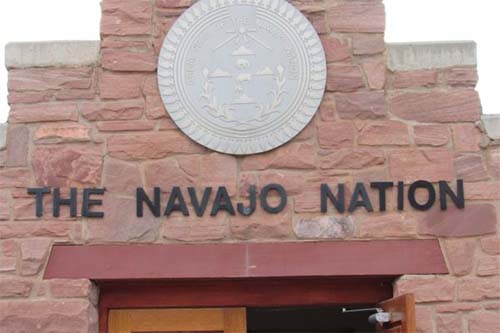
- Details
- By Native News Online Staff
WINDOW ROCK, Ariz. — The Navajo Nation received on Friday an initial $1.8 billion from the U.S. Treasury through the American Rescue Plan Act that was authorized by Congress and signed into law by President Joe Biden. It is part of the historic $31.2 allocated to Indian Country in the American Rescue Plan to assist tribal governments and organizations with costs associated with the Covid-19 pandemic.
“This is the Navajo people’s money and we are obligated to inform the Navajo people every step of the way throughout this process. These funds must be used responsibly and transparently to help our people and our Nation recover from the devastating impacts of the Covid-19 pandemic. We will continue to work together with the 24th Navajo Nation Council, Judicial Branch, Divisions, Chapters, and many others to develop plans and introduce legislation to allocate the funds to provide relief and assistance for our Navajo people and communities,” Navajo Nation President Jonathan Nez said.
The amount received Friday by the Navajo Nation totaled $1,861,554,458.43.
“The Navajo Nation for well over the last year has faced significant challenges when the Covid-19 Coronavirus, also known as ‘Diko Ntsaaígíí-Náhást’éíts’áadah’ in the Navajo language, hit the Navajo Nation. We lost many of our loved ones and elders as we struggled through this disease. These federal funds will be an opportunity to address not only the needs of the Navajo people today, but to be effective and efficient as we build our economy well into the future post Covid-19. The Navajo Nation Council will take great care to use these funds wisely. Navajo’s future will be brighter and we will continue to coordinate with county, state and federal officials to monitor the evolving impacts of the coronavirus,” Speaker Seth Damon of the 24th Navajo Nation Council said.
The initial $1.8 billion allocation is based on self-certified Navajo Nation enrollment numbers that reflect close to 400,000 enrolled members, and the Navajo Nation’s share of $1 billion that is allocated equally among tribes. The remaining 35-percent of the $19 billion will be distributed to tribes based on tribal employment data. Tribes have until June 21, 2021 to confirm or amend employment numbers.
According to the U.S. Treasury, the funds may be used for the following:
Support public health expenditures, by, for example, funding Covid-19 mitigation efforts, medical expenses, behavioral healthcare, and certain public health and safety staff
- Address negative economic impacts caused by the public health emergency, including economic harms to workers, households, small businesses, impacted industries, and the public sector
- Replace lost public sector revenue, using this funding to provide government services to the extent of the reduction in revenue experienced due to the pandemic
- Provide premium pay for essential workers, offering additional support to those who have and will bear the greatest health risks because of their service in critical infrastructure sectors
- Invest in water, sewer, and broadband infrastructure, making necessary investments to improve access to clean drinking water, support vital wastewater and stormwater infrastructure, and to expand access to broadband internet
Within these categories of eligible uses, tribal governments have broad flexibility to decide how best to use this funding to meet the needs of their local communities. Further, in recognition of the pandemic's disproportionate public health and economic impacts in Tribal communities, the following services are also eligible when provided by a Tribal government:
- Addressing health disparities and the social determinants of health, including community health workers, public benefits navigators, remediation of lead paint or other lead hazards, and community violence intervention programs
- Building stronger neighborhoods and communities, including supportive housing and other services for individuals experiencing homelessness, development of affordable housing, and housing vouchers and counseling
- Addressing educational disparities exacerbated by Covid-19, including early learning services, decreasing funding gaps between low- and high-poverty districts, and educational services or tutoring for at-risk students
- Promoting healthy childhood environments, including childcare, home visiting programs, and enhanced services for child welfare-involved families and foster youth
The Navajo Nation will continue to work with the U.S. Department of the Treasury, the Biden-Harris Administration, and federal agencies to ensure the successful implementation of the American Rescue Plan Act funds. For more information, please visit: https://home.treasury.gov/policy-issues/coronavirus/assistance-for-state-local-and-tribal-governments/state-and-local-fiscal-recovery-fund/tribal-governments.
|
More Stories Like This
Native News Weekly (August 25, 2024): D.C. BriefsNavajo Nation Mourns the Passing of Former Vice President Rex Lee Jim
Deb Haaland Earns Endorsement From Communications Workers of America Local 7076
University Soccer Standout Leads by Example
Two Native Americans Named to Democratic Congressional Campaign Committee's“Red to Blue” Program
Help us defend tribal sovereignty.
At Native News Online, our mission is rooted in telling the stories that strengthen sovereignty and uplift Indigenous voices — not just at year’s end, but every single day.
Because of your generosity last year, we were able to keep our reporters on the ground in tribal communities, at national gatherings and in the halls of Congress — covering the issues that matter most to Indian Country: sovereignty, culture, education, health and economic opportunity.
That support sustained us through a tough year in 2025. Now, as we look to the year ahead, we need your help right now to ensure warrior journalism remains strong — reporting that defends tribal sovereignty, amplifies Native truth, and holds power accountable.
 The stakes couldn't be higher. Your support keeps Native voices heard, Native stories told and Native sovereignty defended.
The stakes couldn't be higher. Your support keeps Native voices heard, Native stories told and Native sovereignty defended.
Stand with Warrior Journalism today.
Levi Rickert (Potawatomi), Editor & Publisher

